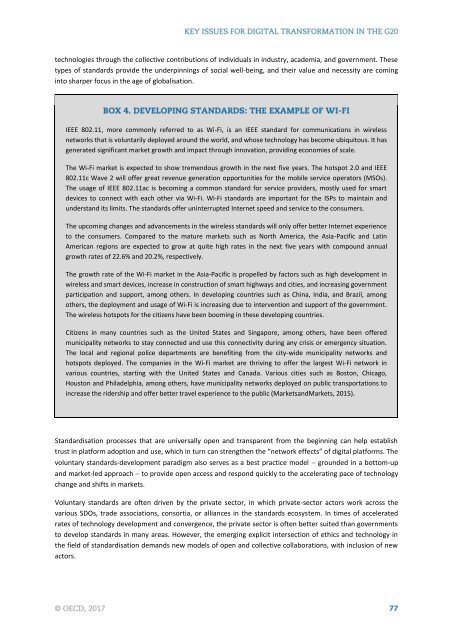KEY ISSUES FOR DIGITAL TRANSFORMATION IN THE G20
2jz0oUm
2jz0oUm
Create successful ePaper yourself
Turn your PDF publications into a flip-book with our unique Google optimized e-Paper software.
technologies through the collective contributions of individuals in industry, academia, and government. These<br />
types of standards provide the underpinnings of social well-being, and their value and necessity are coming<br />
into sharper focus in the age of globalisation.<br />
IEEE 802.11, more commonly referred to as Wi-Fi, is an IEEE standard for communications in wireless<br />
networks that is voluntarily deployed around the world, and whose technology has become ubiquitous. It has<br />
generated significant market growth and impact through innovation, providing economies of scale.<br />
The Wi-Fi market is expected to show tremendous growth in the next five years. The hotspot 2.0 and IEEE<br />
802.11c Wave 2 will offer great revenue generation opportunities for the mobile service operators (MSOs).<br />
The usage of IEEE 802.11ac is becoming a common standard for service providers, mostly used for smart<br />
devices to connect with each other via Wi-Fi. Wi-Fi standards are important for the ISPs to maintain and<br />
understand its limits. The standards offer uninterrupted Internet speed and service to the consumers.<br />
The upcoming changes and advancements in the wireless standards will only offer better Internet experience<br />
to the consumers. Compared to the mature markets such as North America, the Asia-Pacific and Latin<br />
American regions are expected to grow at quite high rates in the next five years with compound annual<br />
growth rates of 22.6% and 20.2%, respectively.<br />
The growth rate of the Wi-Fi market in the Asia-Pacific is propelled by factors such as high development in<br />
wireless and smart devices, increase in construction of smart highways and cities, and increasing government<br />
participation and support, among others. In developing countries such as China, India, and Brazil, among<br />
others, the deployment and usage of Wi-Fi is increasing due to intervention and support of the government.<br />
The wireless hotspots for the citizens have been booming in these developing countries.<br />
Citizens in many countries such as the United States and Singapore, among others, have been offered<br />
municipality networks to stay connected and use this connectivity during any crisis or emergency situation.<br />
The local and regional police departments are benefiting from the city-wide municipality networks and<br />
hotspots deployed. The companies in the Wi-Fi market are thriving to offer the largest Wi-Fi network in<br />
various countries, starting with the United States and Canada. Various cities such as Boston, Chicago,<br />
Houston and Philadelphia, among others, have municipality networks deployed on public transportations to<br />
increase the ridership and offer better travel experience to the public (MarketsandMarkets, 2015).<br />
Standardisation processes that are universally open and transparent from the beginning can help establish<br />
trust in platform adoption and use, which in turn can strengthen the “network effects” of digital platforms. The<br />
voluntary standards-development paradigm also serves as a best practice model grounded in a bottom-up<br />
and market-led approach to provide open access and respond quickly to the accelerating pace of technology<br />
change and shifts in markets.<br />
Voluntary standards are often driven by the private sector, in which private-sector actors work across the<br />
various SDOs, trade associations, consortia, or alliances in the standards ecosystem. In times of accelerated<br />
rates of technology development and convergence, the private sector is often better suited than governments<br />
to develop standards in many areas. However, the emerging explicit intersection of ethics and technology in<br />
the field of standardisation demands new models of open and collective collaborations, with inclusion of new<br />
actors.


